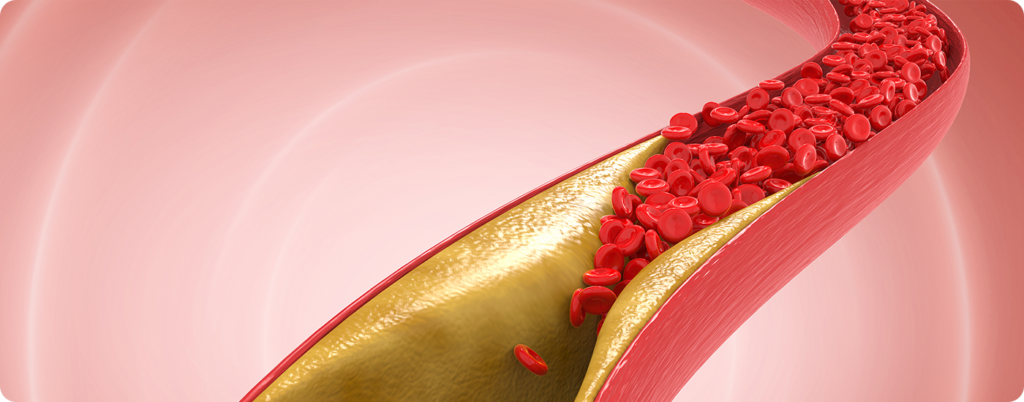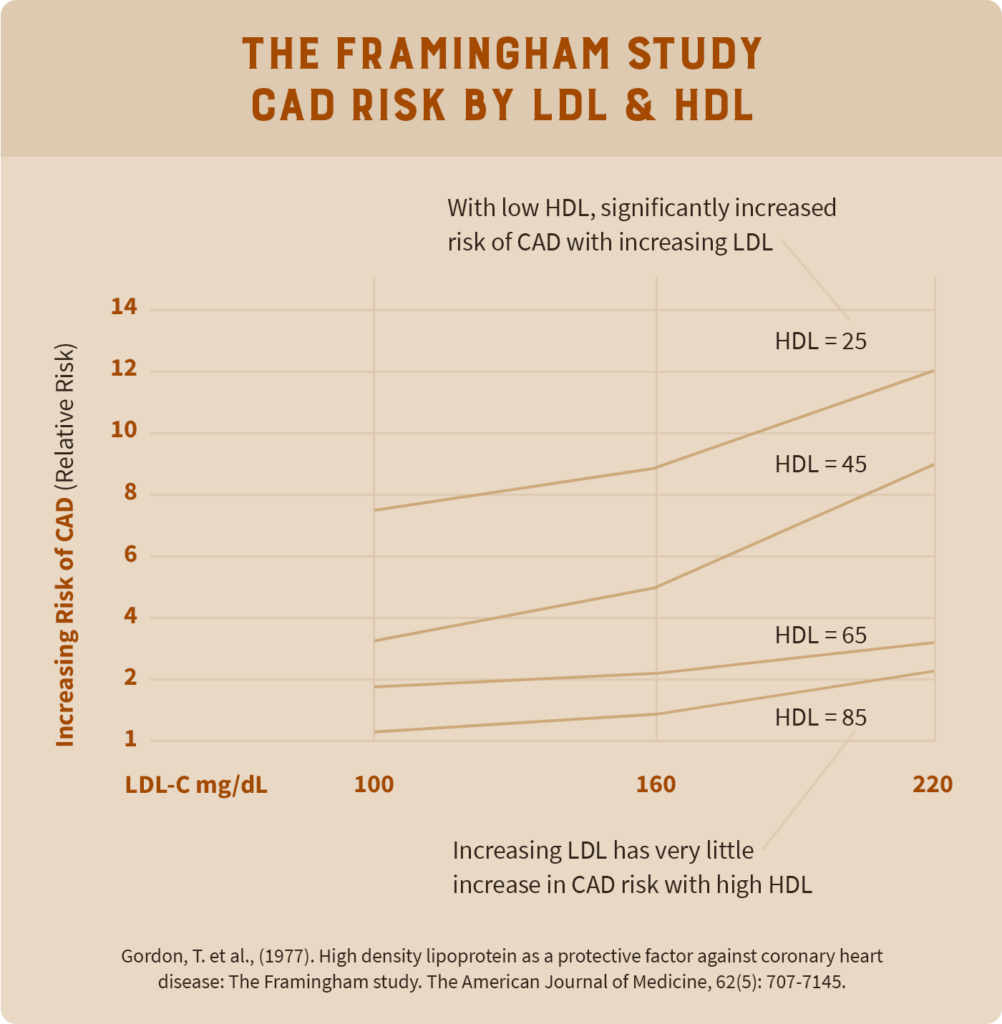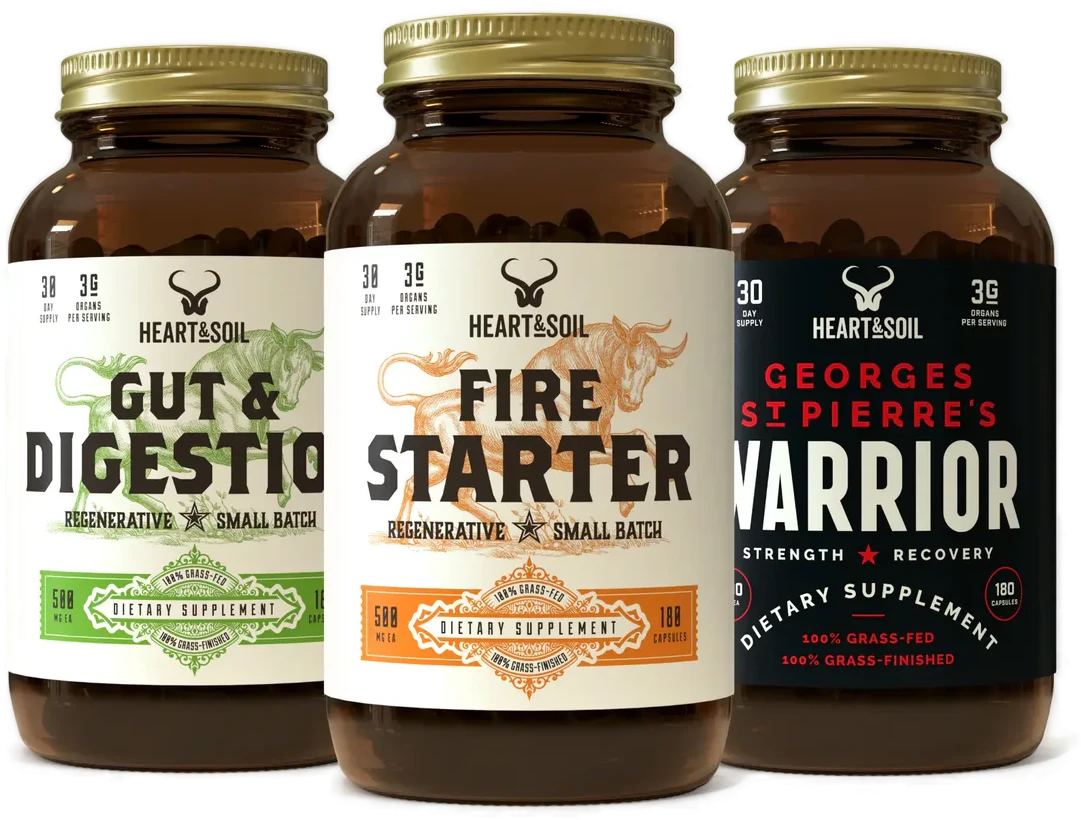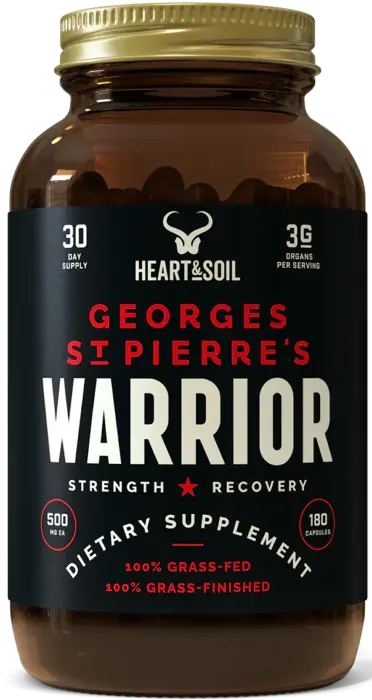PLEASE NOTE: The information in this blog is for educational purposes only. It is not a substitute for professional medical advice. Consult your healthcare provider if you’re seeking medical advice, diagnoses, or treatment.
What this article covers…
- Understanding the basics of cardiovascular health and cholesterol
- The correlation between LDL and cardiovascular disease
- Why metabolic health is crucial
- Other metrics you can look at to better understand the state of your health
- Resources to learn more
So, What Causes Heart Disease?
You’re not alone if you feel concerned about your cholesterol and cardiovascular health. Unfortunately, Western medicine has adopted a stance that is well-intentioned but misleading.
As the prevalence of heart attacks and heart disease has increased, our understanding has also progressed. When you examine heart disease from a mechanical standpoint, the accumulation of cholesterol deposits (“plaque”) in the arteries can lead to atherosclerosis, blockages and heart attacks. If you can stop that plaque from forming, you prevent heart attacks.

Seems simple and common sense, right?
It’s like dealing with a plumbing problem: if your kitchen sink drain is getting clogged because you pour bacon grease down it, you should either stop eating bacon (hence the push for low-fat diets) or use a chemical that dissolves that fat and keeps the drain open. However, this flawed approach has led to a massive pharmaceutical industry focused on lowering cholesterol with statins and preventing arterial plaque.
This mechanical philosophy of treating cardiovascular disease also fails to consider the human body as an integral, evolutionarily refined system with powerful healing potential.
The latest progression of our understanding of cholesterol and heart disease shines new light on the root cause and the most potent remedies. Based on recent scientific literature, we feel confident that dyslipidemia (an imbalance of fats and cholesterol in your blood), atherosclerosis, and heart disease are a function of metabolic dysfunction and inflammation.
This article will explain that premise and suggest ways to keep your cardiovascular system healthy.
A Brief Primer on Cholesterol
At the risk of oversimplifying a complex topic, we will cover a few facts about cholesterol that will help you sort through conflicting messages you may have heard.
- Cholesterol is a broad label given to a range of lipoproteins which your body produces and is critical for producing cell membranes, hormones, and vitamin D (1).
- In effect, both high-density lipoprotein (HDL, often called “good cholesterol”) and low-density lipoprotein (LDL, often called “bad cholesterol”) are high-functioning containers that carry substances that your body needs to stay healthy.
- LDL is a powerful antioxidant.
- HDL helps your body recycle LDL (2).
- Your cholesterol also contains triglycerides, similar to your adipose tissue or “body fat.”
- Your body can use cholesterol from the foods you consume or produce it in the liver.
- Without cholesterol, the walls of your cells become rigid, fragile, and prone to injury (3).
- Statins are a class of drugs that impair your body’s ability to make cholesterol but do not treat the root cause of high cholesterol and heart disease (4).
- Cholesterol is also a key component in digestion, allowing your body to break down food and absorb nutrients.
Now, it’s not unreasonable to look at someone with high cholesterol levels and conclude that there’s a problem.
However, the confusion about cholesterol’s role is ironic: while cholesterol can be a signal that there’s a problem in the body, it’s not the problem itself. If people gather around your house yelling “fire” when it’s on fire, but you decide the people raising the fire alarm are causing it and scare them away, your house will still burn down.
We want to help people extinguish the fire, not silence the body’s natural signaling mechanisms.
The Correlation Between LDL and Cardiovascular Disease
For most of the American population, elevated LDL can indicate underlying metabolic dysfunction, and we often see higher levels of this lipoprotein in the setting of dyslipidemia (cholesterol imbalance) associated with insulin resistance.
Insulin resistance can cause vascular inflammation, which triggers the body’s repair routines, including producing extra cholesterol. Does that mean all cardiovascular disease is a function of insulin resistance? No. That level of causation would require a more thorough scientific study.
We will examine other research pieces that will help explain why LDL is not the culprit that Western cardiology has claimed it is.
The correlation between LDL and cardiovascular disease is nuanced. A good example of this nuance can be seen in the Framingham data (a well-known large cohort study done in Framingham, Massachusetts).
In Paul Saladino, MD’s book The Carnivore Code, he uses a graphic to illustrate the complexity of the relationship between LDL, HDL, and heart cardiovascular disease. LDL levels can rise for people practicing ketogenic, carnivore, or animal-based diets. This isn’t necessarily an early warning for dyslipidemia or cardiovascular disease.

As you can see, there’s a strong correlation between LDL and cardiovascular disease in those with low HDL, but this association isn’t nearly as strong when HDL is higher. What’s going on here? Simple, HDL levels are a good indicator of insulin sensitivity and metabolic health.
Though there are cases in which HDL appears to be lower, genetically, in many people, a low HDL can indicate underlying metabolic dysfunction. Touching back on the list of facts about cholesterol… HDL helps the body recycle LDL. Thus, it makes sense that if there isn’t enough HDL circulating to process LDL, the person in question is at higher risk for atherosclerosis (arterial plaque deposits).
In his book, Dr. Saladino discusses the many protective roles of LDL in the human body, including the immune system.
Again, when viewed at a high level, if you’re analyzing your cholesterol levels from a bloodwork panel, the ratio of HDL to LDL is far more important than the presence of elevated LDL. And if you have elevated LDL levels, it’s a signal that your body is working to address another problem, be it inflammation, insulin resistance, or something else.
Re-Evaluating Cholesterol: Quality Over Quantity
Cholesterol can be intimidating, but we haven’t been presented with the full picture.
Healthcare professionals have been trained to focus solely on LDL as the “bad cholesterol” and the primary risk factor for cardiovascular disease. You might also hear about chylomicrons, VLDL, IDL, LDL (patterns A and B), HDL, Lp(a), Lp-PLA2, and apolipoproteins like Apo(a) and Apo(b).
While identifying the types and quantity of lipoproteins may be valuable, we believe the quality of the particles is far more telling of our overall cardiometabolic health.
Studies indicate that (unmodified LDL) is not atherogenic and does not contribute to foam cell formation, a critical step in heart disease initiation (5, 6, 7). Additionally, cases of cardiovascular disease exist even with low or normal levels of LDL, suggesting that LDL quantity alone may not be the sole determinant of cardiovascular health (8).
Quality matters significantly in understanding atherosclerosis. Research reveals that oxidative damage triggering foam cell formation is crucial in initiating atherosclerosis. There is a strong link between the level of oxidized LDL and cardiovascular disease (9, 10, 11), as evidenced by various studies involving both humans and animals (12, 13, 14).
Recognizing this association helps us grasp the significance of LDL beyond its mere quantitative presence in the body.
Metabolic Health: The Missing Piece
When metabolic health is compromised, it can disrupt the delicate equilibrium within the body and result in chronic inflammation.
Several factors contribute to metabolic dysfunction, including excess abdominal fat, lack of physical activity, poor sleep patterns, chronic stress, excessive alcohol consumption, genetic factors, exposure to environmental toxins, and an improper diet (15).

Linoleic acid, particularly in the form of industrial seed oils, promotes the oxidation of LDL, inflammation, and the development of atherosclerosis, which is strongly associated with heart disease (16).
Although your body can only get linoleic acid from your diet, most people consume 10-20 times more than our ancestors likely consumed (17). Linoleic acid from highly processed vegetable oils such as canola and soybean is associated with many problems like weight gain and chronic disease (18).
Outside of critical interventions, we believe that treating the body as an intelligent, evolutionarily refined, self-healing system is the best approach. The key to specific health problems is often contained in foundational lifestyle changes. For example, if you restore metabolic function, you’ll often see reduced insulin resistance, inflammation, and improved cholesterol readings.
If your health is not where you’d like it to be, we believe it can help to follow a nourishing, animal-based diet. As part of the animal-based diet, organs provide essential nutrients, peptides, growth factors, vitamins, and minerals your body needs to function properly.
If fresh organs are not accessible, Warrior can be a great alternative, as can Firestarter, which signals fat cells to shrink. Consistent exercise, play in nature, and stress management are essential (19, 20, 21, 22, 23) and additional ways to improve your metabolic health.
Fat Loss Stack
Grass-Fed Organs for Metabolic Health
Conventional Lipid Testing Profiles: Proceed With Caution
In this discussion with Michael Twyman, MD, and Paul Saladino, MD, you can get a cardiologist’s perspective on conventional lipid testing and bloodwork.
In short, several co-factors should be considered beyond the simple ratio of HDL to LDL. This approach to lipid analysis may not be familiar to your physician, but don’t let that stop you from asking for more information or a second opinion when your bloodwork comes back from the lab.
Here is an overview of metrics that we think are important:
- Triglycerides/HDL Ratio: Insulin resistance, shown by a high triglyceride/HDL ratio, is more associated with adverse cardiovascular outcomes than LDL metrics (24). We consider a metabolically healthy triglyceride/HDL ratio less than two (25,26).
- Oxidized LDL (OxLDL): You can learn more about oxLDL by watching this podcast episode with Dr. Saladino and cardiologist Nadir Ali, MD. They discuss how LDL that has been oxidized is more likely to build up on artery walls and contribute to diabetes and heart disease (27).
- Fasting Insulin: Fasting insulin seems to be a better indicator of metabolic health than blood glucose (28,29). We consider fasting insulin of <5 metabolically healthy. A high fasting insulin can suggest pathologic insulin resistance, significantly increasing cardiovascular disease risk (30).
- Linoleic Acid Content: We believe metabolic dysfunction is primarily caused by excess linoleic acid in our diet, mainly from foods like vegetable oils (31,32). Instead of solely looking at the traditional lipid testing profiles, we find it more interesting to look at the linoleic acid content of whole blood and red blood cells. We like to see whole blood below 18% and red blood cells below 5.2% (33).
- Visceral Fat: We like to see a visceral adipose tissue scan (using a DEXA scan) that scores on the lower end of the reference range (34).
- Endothelial Health: The MaxPulse and the EndoPAT are two devices used to measure vascular health, an essential signifier of risk for cardiovascular disease.
If you’re looking for a second medical opinion or a new physician, we suggest using the Society of Metabolic Health Practitioners or The Institute for Functional Medicine to find a physician to help you address your metabolic and cardiovascular issues.
Resources to Learn More
Here are several resources you can use to understand the root of this challenge better.
1. Playlist: Cholesterol and Cardiovascular Disease (18 videos, YouTube)
This playlist contains more than 20 hours of videos with Dr. Saladino and other medical experts discussing the topic of cholesterol, keto and carnivore diets, cardiovascular disease, and more.
2. Podcast: The TRUTH about Cholesterol and Heart Disease with Dr. Mark Hyman and Dr. Zach Bush (61 minutes, YouTube)
In this concise video, Dr. Zach Bush and Dr. Mark Hyman explain the fundamentals of cholesterol and heart disease. Popular medicine has cast cholesterol as the primary villain in heart disease. Adopting behaviors that lead to thriving health is easier once you better understand cholesterol and how it interacts with other factors to cause disease.
3. Video: Dr. Nadir Ali – Why LDL cholesterol goes up with a low-carb diet, and is it bad for health? (17 minutes, YouTube)
Dr. Nadir Ali is an interventional cardiologist with over 25 years of experience. He is also the chairman of the Department of Cardiology at Clear Lake Regional Medical Center. Before working as a cardiologist, he served as an assistant professor of medicine for eight years at Baylor College of Medicine in Houston, where he also received his medical training. In this video, he explains why LDL can increase on a low-carb diet and why it is an ally in your health, not an enemy.
4. Podcast: Weight loss, cholesterol, and seed oils, Kyle Kingsbury interviews Paul (113 minutes, YouTube)
Dr. Saladino sits down with former football player, retired American professional mixed martial artist, former Director of Human Optimization at Onnit, and host of The Kyle Kingsbury Podcast, Kyle Kingsbury. They do a deep dive into ideals that Dr. Saladino is passionate about, and Kyle interviews him about the truth behind seed oils, cholesterol, weight loss, and more controversial topics.
5. Article: Cholesterol Is Good, The American Heart Association is Bad (estimated reading time 10 minutes, DrCate.com)
In this article, Dr. Cate unpacks events that led to the promotion of omega-6 PUFAs as heart-healthy and the demonization of saturated fats. Dr. Cate Shanahan is the leading authority on nutrition and human metabolism.
6. Video: Hard science on the real cause of heart disease – why you should avoid seed oils (25 Minutes, YouTube)
Dr. Paul Mason discusses an alternative viewpoint to the real causes of heart disease. He discusses blood clots, seed oils, cholesterol, pollution, diabetes, and statins.
Maximize Your Performance, Strength, & Recovery
Georges St-Pierre's WARRIOR
Subscribe to future articles like this:

